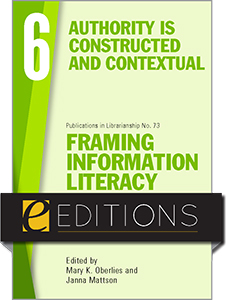
Framing Information Literacy (PIL#73), Volume 6: Authority is Constructed and Contextual—eEditions PDF e-book
The download link for this product can be found on the final confirmation screen after you complete your purchase, and may also be accessed from your Account Profile. For more information about ALA eEditions file types and how to view them on eReaders, desktop computers, and other devices, see this page.
Primary tabs
You don't need to be an ALA Member to purchase from the ALA Store, but you'll be asked to create an online account/profile during checkout to proceed. This Web Account is for both Members and non-Members. Note that your ALA Member discount will be applied at the final step of the checkout process.
If you are Tax-Exempt, please verify that your account is currently set up as exempt before placing your order, as our new fulfillment center will need current documentation. Learn how to verify here.
- Description
- Table of Contents
- About the authors
Authority is Constructed and Contextual
Information resources reflect their creators’ expertise and credibility, and are evaluated based on the information need and the context in which the information will be used. Authority is constructed in that various communities may recognize different types of authority. It is contextual in that the information need may help to determine the level of authority required.
Many librarians struggle with the best methods, activities, and practices for teaching information literacy. Developing learning outcomes and activities, overcoming student and faculty apathy toward information literacy instruction, and meeting instructional and institutional goals can be difficult if you’re feeling overwhelmed with instructional jargon, or uncertain in your teaching due to no formal training.
Framing Information Literacy: Teaching Grounded in Theory, Pedagogy, and Practice is a collection of lesson plans grounded in theory and the ACRL Framework for Information Literacy for Higher Education. 52 chapters over six volumes provide approachable explanations of the ACRL Frames, various learning theory, pedagogy, and instructional strategies, and how they are used to inform the development of information literacy lesson plans and learning activities. Each volume explores one frame, in which chapters are grouped by broad disciplinary focus: social sciences, arts and humanities, science and engineering, and multidisciplinary. Every chapter starts with a discussion about how the author(s) created the lesson, any partnerships they nurtured, and an explanation of the frame and methodology and how it relates to the development of the lesson, and provides information about technology needs, pre-instruction work, learning outcomes, essential and optional learning activities, how the lesson can be modified to accommodate different classroom setups and time frames, and assessment.
The six volumes of Framing Information Literacy aim to address the teaching anxiety and insecurity librarians often experience by offering narratives with the lesson plans that provide insight into the work involved in developing a polished lesson plan; begin filling the teaching and learning knowledge gap for librarians in the context of information literacy, capturing the knowledge and practice of fifty-eight teacher librarians and five teaching faculty from forty-one institutions for others to incorporate and build upon; and to explore how teacher librarians use the ACRL Framework in conjunction with educational theory and pedagogy to help readers form their own approaches to teaching information literacy.
Each volume contains the table of contents and index for the entire set, as well as an overarching introduction and conclusion, for easy cross-referencing across volumes. Explore your favorite frame, or collect them all!
Acknowledgements
Introduction
Mary K. Oberlies and Janna Mattson, MLS
Volume 6. Authority Is Constructed and Contextual
Chapter 42. Validating Search and Discovery Skills through Altruistic Research: The Favor Assignment
Janette L. Finch and Jolanda-Pieta van Arnhem, College of Charleston
Chapter 43. Flip It! Using a Flipped Lesson Plan to Extend a One-Shot for a Freshman Speech Course
Allison Carr, California State University, San Marcos
Chapter 44. Teaching Bias with a Skyhook
Stephen A. Sanders and Elizabeth A. Sanders, Southeastern Louisiana University
Chapter 45. Grappling with Authority in First-Year Writing
Maglen Epstein, St. Olaf College
Chapter 46. Examining Justice Models Through Social Media
Janna Mattson, George Mason University
Chapter 47. Teaching Business Students Leadership Skills Using Adult Learning Theory
Charissa Jefferson, California State University, Northridge
Chapter 48. Learning Places at the Intersection of Information Literacy and Place-Based Learning
Anne E. Leonard, New York City College of Technology
Chapter 49. Breaking it Down: Flipping Library Instruction for Non-Traditional Undergraduate Engineers
Karna Younger and Rebecca Orozco, University of Kansas
Chapter 50. Biased Against Apathy: Harnessing Curiosity and Knowledge Gaps in Source Analysis
Katherine Eastman, James Gilbreath, University of Alabama, and Karlie Johnson, Jacksonville State University
Chapter 51. On Whose Authority?: Teaching Evidence-Based Practice Point-of-Care Research to the Nursing Student
Lauren M. Young, Samford University and Elizabeth G. Hinton, University of Mississippi Medical Center
Chapter 52. Evaluating and Reporting on the Authority of Scientific Information
Denise FitzGerald Quintel, Mary Ellen Sloane, and Angelique Troelstrup, Middle Tennessee University
Conclusion
Index
Mary K. Oberlies
Mary K. Oberlies is the Undergraduate Engagement Librarian and Assistant Librarian at the University of Oregon. She received her MAIS from the University of Missouri-Columbia, an MA in Violence, Terrorism, and Security from Queen's University at Belfast, and a BA in International Studies from Berry College.
Janna Mattson
Janna Mattson is the Instructional and Social Sciences Librarian at George Mason University. She received her MEd from George Mason University along with a graduate certificate in eLearning, an MLS from Queens College, City University of New York, and a BA in Music from Virginia Commonwealth University.


